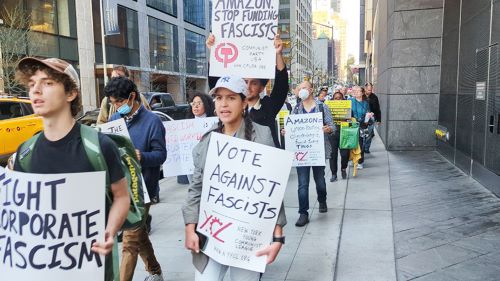

There are broader anxieties about authoritarian tendencies encroaching on individual rights.

By Matthew A. McIntosh
Public Historian
Brewminate
In recent years, the United States has experienced profound political, social, and economic shifts that have brought renewed attention to concepts like corporatism and fascism. These terms, often associated with early 20th-century Europe, resonate in modern debates about the concentration of power, the health of American democracy, and the growing influence of corporations in governance. To understand what is unfolding today, it is crucial to explore how corporatism and fascism manifest in contemporary America and how current events reflect or diverge from these ideologies.
Corporatism, in essence, describes a system where key sectors of society—especially business and labor groups—are formally integrated into political decision-making processes. While traditional corporatism has not taken overt form in the United States, the increasing intertwining of corporate power with government policies highlights modern tendencies toward what some call “corporatocracy.” In recent years, corporate lobbying and political donations have reached unprecedented levels. Large tech companies, major financial institutions, and defense contractors exert considerable influence over legislation and regulatory decisions. This influence is visible in debates over healthcare, environmental regulation, data privacy, and taxation.
The COVID-19 pandemic underscored this dynamic. The distribution of billions in government relief funds often favored large corporations over small businesses or individual workers, exacerbating economic inequalities. Pharmaceutical companies, for example, negotiated government contracts with significant leverage, prompting public outcry over drug pricing and access. Meanwhile, major social media and technology firms gained immense power as people shifted their lives online, sparking debates about corporate responsibility and government oversight.
Amid these developments, concerns about fascism have also entered mainstream conversations, though the term remains contentious. While the U.S. government is not fascist by classical definitions, certain political movements and behaviors exhibit troubling parallels. The past several years have seen an increase in authoritarian rhetoric from some political leaders, including attacks on the free press, undermining of the judicial system, and efforts to question or restrict the legitimacy of elections. These actions have been accompanied by nationalist and exclusionary messaging that echoes fascist themes of ultra-nationalism and scapegoating of minorities or political opponents.
The January 6, 2021 attack on the U.S. Capitol was a stark illustration of these tensions. It revealed how extremist groups and conspiracy-driven movements could be mobilized against democratic institutions. Although this event did not signal the establishment of a fascist regime, it highlighted vulnerabilities in American democracy and the potential for authoritarian-leaning forces to gain influence.
Simultaneously, the role of corporations in these political shifts cannot be ignored. Some companies and CEOs have taken public stances on social issues, attempting to balance profit motives with social responsibility. Others have been accused of quietly supporting or funding political actors and policies that undermine democratic norms, reflecting a pragmatic if not outright cynical, engagement with the political system. This creates a complex relationship where corporate power sometimes serves as a counterbalance to populist authoritarianism, but at other times enables it by aligning economic interests with political agendas.
Another important aspect of this dynamic is the erosion of regulatory independence. Federal agencies tasked with overseeing industries such as banking, energy, and telecommunications have often faced political pressure to adopt industry-friendly policies. Regulatory “capture,” where agencies prioritize the interests of the industries they regulate over the public good, has intensified concerns about the integrity of democratic governance.
Moreover, the militarization of law enforcement and the expansion of surveillance technologies in the name of national security evoke warnings reminiscent of fascist control mechanisms. Recent debates over policing reforms, civil liberties, and government surveillance reflect broader anxieties about authoritarian tendencies encroaching on individual rights.
Yet, despite these alarming trends, the American political system continues to feature vibrant opposition movements, an independent judiciary (albeit under pressure), and a relatively free press that exposes abuses of power. Grassroots activism, increased voter participation, and legal challenges serve as critical checks against authoritarian drift. While America today is not a corporatist or fascist state in the classical sense, elements of corporatism and authoritarianism are increasingly visible in its political and economic landscape. The entanglement of corporate power with government decision-making, the erosion of democratic norms, and the rise of nationalist and exclusionary political rhetoric all contribute to a fraught moment in American democracy. The challenge moving forward is to recognize these threats and work collectively to strengthen democratic institutions, uphold transparency, and ensure that power—whether economic or political—serves the broader public interest rather than narrow elite agendas.
Originally published by Brewminate, 06.17.2025, under the terms of a Creative Commons Attribution-NonCommercial-NoDerivatives 4.0 International license.


